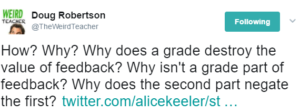
Let’s talk about assessment.
…
OK, now that I’ve scared off any random students who’ve managed to find my website, let’s have an honest talk about assessment.
Grades in one form or another have been a staple of education for a very long time indeed. With the push to quantify school quality through standardized testing and the overall inertia that we normally encounter in academia in general, they don’t look like they’ll be going away any time soon.
So naturally, they’re a perfect thing for progressive ed reformers to rally against. Kids hate them (unless they have an A), teachers hate assessing which grades to give (unless it’s self-grading), and parents hate having to come in for parent/teacher conferences to discuss them, so let’s trash them, right?

Not so fast.
Grades, like paper in an art room, still serve more than one essential need in the classroom. Unlike slide rules and filmstrip projectors, we still use grades because we haven’t come up with a better alternative for them. They work.
Let’s start with the point that Mr. Robinson brings up in his initial rebuttal: Feedback.
Grades on individual assignments let students know the skill with which they completed the assigned task. Those grades can (and should be) itemized in such a way that students also know how well they accomplished various subcategories of the skills being assessed. Their cumulative grade (which if done well should be accessible at any time, not just when Progress Reports or Report Cards are sent home) helps students know how well they’re doing in the course overall. Ideally they should have some idea about how much each assignment weighs against the other tasks they are given throughout the course.
Yes, I can give feedback just through constructive and positive criticism, but while those things are crucially important parts of my curriculum, the ability to boil something down to a number or letter can help the student better understand their growth than me just saying “Hey, that was reasonably better than last time!”

Next up: Grades do the same thing for me that they do for the students.
For the past eight years, my grade book has been a Google Sheet with more annotations, comments, and conditional formatting than is healthy for any web-based system. It is packed full of additional information that explains or clarifies various scores and why they are what they are.
This is incredibly useful information that I’ve gone back to on many occasions throughout the year, but it doesn’t beat being able to highlight the row a child’s scores are in and scroll across to see trends in the data. I can do that with numbered (or lettered) grades far faster than I’d ever be able to do that without them.
I’ve often complained that education is a dinosaur that needs to do some serious evolving if it’s to continue to be meaningful and helpful to our students, but when it comes to getting rid of grades? That’s throwing the baby out with the bath water.
There are a few kinds of assessment that I could do without (Die, standardized testing, DIE!), but let’s keep grades around for a while. They haven’t failed us yet.
Pun intended.
